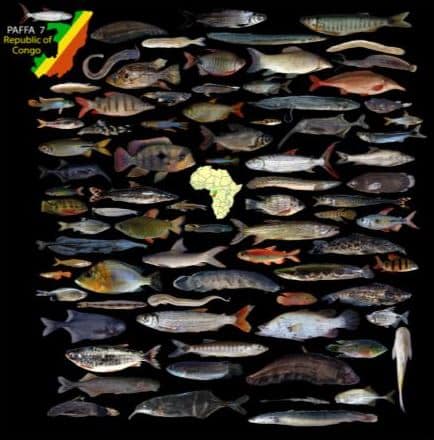Event
7TH International Conference of the Pan African Fish and Fisheries Association (PAFFA)
African Fish and Fisheries : Diversity, Conservation and Sustainable Management

Event details
- Conference
- Start: 18.09.2023 - 10:00 am
- End: 22.09.2023 - 5:00 pm
- University of Marien Ngouabi, Brazzaville (Republic of the Congo)
- Congo, Republic of the
- Visit this link for more details
More info about the Event
Organized by the Department of Oceanography and Environment of the National Institute of Research in Exact and Natural Sciences (IRSEN), the National School of Agronomy and Forestry of the University of Marien Ngouabi and the Laboratory of Research in Biology and Animal Ecology (LARBEA) of the ’Ecole Normale Supérieure’ (ENS) of the University of Marien Ngouabi.
With the financial support of the:
- Royal Museum for Central Africa (Tervuren, Belgium)
- American Museum of Natural History (New York, USA)
- JRS Biodiversity Foundation (Virginia, USA) through the Biodiversity Research Institute of Tulane University (USA)
- Museu de Zoologia – Universidade de São Paulo (Brazil)
The fresh- and brackish water fish fauna of Africa is highly diverse and comprises over 3700 species belonging to some 520 genera and about 90 families. These fishes inhabit a wide variety of habitats ranging from small temporary streams to large and permanently flowing rivers, as well as from shallow and swampy water bodies to large deep lakes, in dry and wet climatic zones.
In many African countries, fishes are a major source of protein and income generation. While in many regions capture fisheries are fully or over-exploited, the development of aquaculture in Africa continues to lag its predicted potential. Despite its economic and social importance, the African fish fauna is exposed to many threats, most of which are of anthropogenic origin. The major causes of the loss of fish diversity are habitat alteration, the introduction of alien species, overexploitation of fisheries resources, and pollution.
Much research has been, or is being, conducted on the fish and fisheries of the African continent. To access and share this growing body of scientific knowledge, it was recognized that an international gathering bringing together scientists from around the globe was required. The first of such meetings took place in 1993 in Dakar, Senegal; the second in Grahamstown, South Africa in 1998; the third in Cotonou, Benin in 2003, the fourth in Addis Ababa, Ethiopia in 2008, the fifth in Bujumbura, Burundi in 2013, the sixth in Mangochi, Malawi in 2018, and the seventh is now due to take place on 18-22 September 2023 in Brazzaville (Republic of the Congo).
This meeting provides an opportunity for scientists from throughout Africa and around the World to come together, to get to know one another, exchange information and ideas, and to initiate collaborative studies. The conference is by far the largest one for scientists studying African fishes and many renowned scientists, young researchers, and other stakeholders are expected to attend this important meeting.
We ask you to assist us in disseminating this information to all relevant individuals and institutions. If you have any questions or queries, please don’t hesitate to contact the organizing committee at paffa2023@gmail.com.
A website is currently under development for PAFFA 7, and once accessible the url for the site will be made available and regularly updated with information.
THEMES OF THE CONFERENCE
1. Fish systematics, biodiversity research and data management
· Taxonomy, morphological and molecular systematics, and phylogenomics.
· Evolution and speciation, adaptive radiation, bio- and phylogeography.
· Biotic surveys and inventories, including eDNA studies.
· Databases and bioinformatics, strategies for information sharing.
2. Biology, ecology, and behaviour
· Ecology, life history strategies, and migratory biology.
· Parasites and diseases.
· Behaviour, morphology, and physiology.
3. Aquatic resource conservation and management
· Human impact on fish diversity and exploitation.
· Freshwater biodiversity as indicators of health.
· Conservation strategies and sustainable management of aquatic systems.
4. Fish and food security
· Capture fisheries, aquaculture, and ornamental fish trade.
· Socioeconomics of fish diversity in human culture.
International Organizing Committee
V. Mamonekene (R. Congo), A. Ibala Zamba (R. Congo), E. Kaunda (Malawi), G. Banyankibona (Burundi), A. Getahun (Ethiopia), Ph. A. Laleye (Benin), H. Bart (USA), M.L.J. Stiassny (USA), M. De Pinna (Brazil), J. Snoeks (Belgium).
Local Organizing Committee
Prof. V. Mamonekene (Department of Oceanography and Environment, IRSEN/ENSAF, UMNG), Prof. A. Ibala Zamba Department of Oceanography and Environment, IRSEN/National Institute of Agricultural Research/ENSAF, UMNG),
Prof. I. Mady Goma Dirat (Laboratory for Research in Biology and Animal Ecology, ENS), Prof. J. Goma-Tchimbakala (National Institute of Research in Exact and Natural Sciences (IRSEN), Dr. D.B. Olabi Obath (Laboratory for Research in Biology and Animal Ecology, ENS), Prof. E.A. Issali (National Institute of Agricultural Research), Dr. M. Nkoua Gavouka (National Institute of Research in Exact and Natural Sciences (IRSEN).
Contact: paffa2023@gmail.com
Official Languages: English and French




